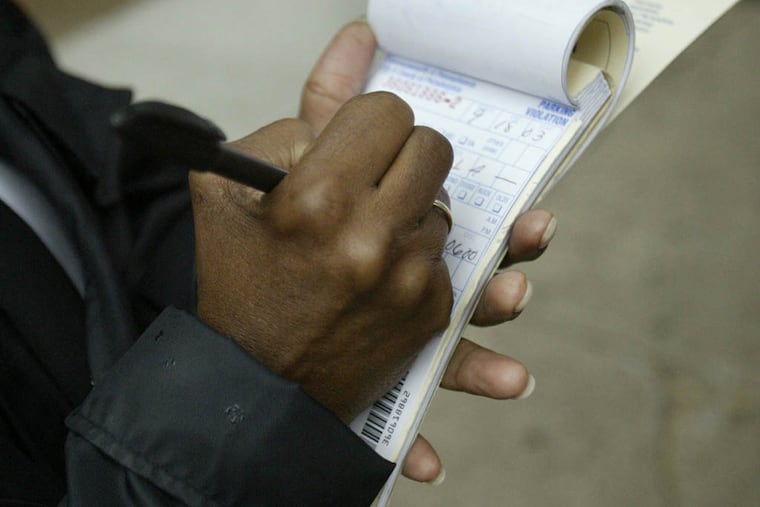Parking fines could rise as Philly tries to reduce traffic
Council also took a step toward approving a new form of car share for the city.

Center City’s congestion troubles are prompting City Council to consider more costly fines for a range of parking violations.
The proposal, approved by Council’s Streets Committee on Wednesday, would increase the fines for illegal parking offenses like double parking, blocking a crosswalk, or parking on a sidewalk. Committing those offenses would result in a $100 violation, compared with $75 now in Center City, or $50 outside Center City.
“Drivers need to realize these violations are contributors to traffic congestion,” Scott Petri, the Philadelphia Parking Authority’s executive director, testified to the committee.
The proposal was one of three bills on the agenda Wednesday designed to reduce congestion. The others were a bill to allow a new car-share company to operate in Philadelphia, which also passed, and a proposal to significantly increase the cost of parking permits for contractors, which was tabled. The bills that passed will be sent to the full Council for a vote.
>>READ MORE: WHY IS PHILLY STUCK IN TRAFFIC?
Fifty-two parking violations would see fines increase if the bill becomes law. But the fine for exceeding the time limit at meters or timed spots would remain the same, PPA officials said. The money collected from the violations would be added to on-street parking revenue shared between the city and the Philadelphia School District. Philadelphia has seen some success in pilot programs that have boosted enforcement efforts of dangerous parking and traffic violations.
“Evidence has shown that many current fines are not a deterrent to illegal parking behaviors,” Christopher Puchalsky, director of policy and strategic initiatives for the city’s transportation office, told the committee. “Studies in other cities have shown that increased fines as a part of an overall approach to better manage traffic and curbside use can increase mobility.”
City officials will increasingly seek legislative solutions to Philadelphia’s congestion woes, Puchalsky said.
“You’re going to continue to see stuff roll out over the next couple of years,” he said.
Among the solutions discussed in the hearings were ways to use fees to encourage truck companies to make deliveries overnight. One possibility would be to make it more expensive to make deliveries during the day, and then offer discounts to companies that deliver at night.
The possibility of congestion pricing also came up. City officials have said a form of congestion pricing might first come to Philadelphia through additional fees for ride-share vehicles that operate in high congestion areas during busy hours.
Philadelphia has the ninth-worst congestion among American cities, according to a report released in February by INRIX Inc., a Washington-based transportation analytics company. The study found Philadelphia drivers spent 112 hours in congestion last year at a cost of $1,568 per person. The causes include more people, more driving, and more online commerce that results in more deliveries.
>>READ MORE: How the delivery economy is disrupting Philadelphia’s street grid
The other bill being pitched as a congestion reliever would open Philadelphia to a new model of car share that does not require the vehicle to be returned to a particular lot after use. The company Share Now Car2Go, which has been in negotiations with the city, proposes having its vehicles parked throughout the city. When users drive one, they can just leave the vehicle at their destination, and another registered with the system can use it from there. The user is charged for the time they spend driving.
The bill would allow one company to establish a car-share network, with the possibility of two more to be added after the one-year pilot program ends. The vehicles in the network would be exempt from parking regulations within a zone that goes as far west as 50th Street, and spans from Lehigh Avenue to Philadelphia International Airport. In exchange, the pilot company would pay $500 a car annually.
Officials from Share Now said in testimony Wednesday that each of its vehicles takes the place of 11 cars driven by vehicle owners.
Also Wednesday, the streets committee approved the PPA’s plan to replace residential parking permit stickers with digital permits by this time next year. Instead of looking for a window sticker, PPA personnel would scan a license plate to determine whether a vehicle had parking permission.